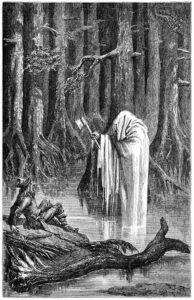We know the story of Elisha retrieving the iron axe head by having it float to the surface of a river. It is in 2 Kings 6:1-7:
The company of the prophets said to Elisha, “Look, the place where we meet with you is too small for us. Let us go to the Jordan, where each of us can get a pole; and let us build a place there for us to meet.”
And he said, “Go.”
Then one of them said, “Won’t you please come with your servants?”
“I will,” Elisha replied. And he went with them.
They went to the Jordan and began to cut down trees. As one of them was cutting down a tree, the iron axhead fell into the water.
“Oh no, my lord!” he cried out. “It was borrowed!”
The man of God asked, “Where did it fall?”
When he showed him the place, Elisha cut a stick and threw it there, and made the iron float.
“Lift it out,” he said. Then the man reached out his hand and took it.
Back in 1997 Yaaqov Kupitz drew attention to the similarity of the biblical story with one of Aesop’s fables:
In the Second Book of Kings (Kings II. 6: 4-7), a man is cutting down a tree on the banks of the Jordan to build a shelter when the iron blade (Hebrew barzel) of his axe falls into the water. He asks for help and Elisha, “the man of God”, throws a piece of wood into the river and the blade, literally the “iron”, begins to float. This miracle is in fact a fable by Aesop, Hermes and the woodcutter. A man is cutting down a tree on the bank of a river when his axe (Pélékoun in Greek) falls into the water. The man sits down and weeps. Hermes, the god of discovery, hears his cries, dives in three times and successively brings up a golden axe, a silver one and the original iron one. The woodcutter then retrieves his, ignoring the other two. Note that there is a moral to this story, whereas Kings only lists Elisha’s miracles. In the Book of Kings, the axe is metonymized by the material of its blade, iron, and the Greek sidéro, ‘iron’, can also mean ‘axe’…
Kupitz, Yaaqov S. “La Bible Est-Elle Un Plagiat?” Sciences et Avenir 86, no. Hors-Série (December 1997): 84.
Kupitz’s ideas were a special inspiration for Philippe Wajdenbaum’s Argonauts of the Desert, a work discussed on this blog at various times. (Thanks to Russell Gmirkin for mentioning Kupitz in a recent comment and reminding me and bringing K’s 1997 article to my attention.)
The fable from Handford’s translation.
A man who was cutting wood on a riverside lost his axe in the water. There was no help for it; so he sat down on the bank and began to cry. Hermes appeared and inquired what was the matter. Feeling sorry for the man, he dived into the river, brought up a gold axe, and asked him if that was the one he had lost. When the woodcutter said that it was not, Hermes dived again and fetched up a silver one. The man said that was not his either. So he went down a third time and came up with the woodcutter’s own axe. ‘That’s the right one,’ he said; and Hermes was so delighted with his honesty that he made him a present of the other two axes as well. When the wood-man rejoined his mates and told them his experience, one of them thought he would bring off a similar coup. He went to the river, deliberately threw his axe into it, and then sat down and wept. Hermes appeared again; and on hearing the cause of his tears, he dived in, produced a gold axe as before, and asked if it was the one that had been lost. ‘Yes, it is indeed,’ the man joyfully exclaimed. The god was so shocked at his unblushing impudence, that, far from giving him the gold axe, he did not even restore his own to him.
The biblical account involves a God who, unlike Hermes, is not a trickster out to tempt and deceive mortals (at least not in the Elisha tale). Nor is the figure who loses the axe head threatened by the loss of his means of livelihood. Rather, the biblical tale is about a righteous disciple of the prophet. His work is a work of righteousness, a work for the benefit of the community of Elisha’s followers. The loss of the axe head means the workman is unable to fulfil a righteous act in returning a valued and necessary borrowed item.
The biblical account is about a god who would be embarrassed by the shenanigans of Hermes in the fable. Plato condemned the immoral and inconstant character of Greek gods. Yes, Hermes is in a sense righteous in the fable: but he is clearly going about the testing of the human’s character in a deceptive way. For the fable to “translate” to a tale involving a biblical deity and his righteous disciples, it must be shed of its deception. A simple, no-nonsense restoration of the “daily needs” of the servants of God is all that is required. The change has been so effective that many devout readers through the ages have interpreted the straightforward and staid tone of biblical miracles as evidence of their historical reality.
. . .
Here’s an older illustration. Interesting to contrast modern perspectives of how gods are portrayed for children:

